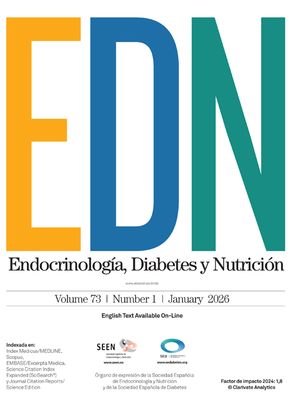Metabolic hereditary diseases or inborn errors of metabolism are included in the so-called rare diseases, those with an incidence lower than 5 per 10,000 inhabitants.1 Approximately half of them start in the neonatal period or in first infancy.
Neonatal screening and diagnostic and therapeutic advances have modified the natural history and prognosis of conditions responsive to therapeutic measures. These patients with chronic and complex diseases therefore reach adult age and continue to require specialized hospital care. Not uncommonly, the pediatrician continues to provide care due to the lack of adequate facilities. Fortunately, several adult follow-up centers are currently operating in Europe and America. Some of them have reported their experience in the transition from pediatric care, emphasizing key aspects such as the poor specific training of adult specialists, the lack of adapted clinical protocols, the complexity of the problems, the multiple therapeutic needs, and the need for economic and human resources.2–6
The challenge posed at our hospital was to create a specialized care unit for adult patients with metabolic hereditary diseases, in coordination with the pediatric center of origin and aimed at meeting the “new” requirements of these patients (genetic counseling, pregnancy control, etc.). This unit, which is part of the working group for Rare Diseases and is coordinated by two internists, is multidisciplinary and consists of professionals from the departments of biochemistry, endocrinology and nutrition, gynecology, genetics, neurology, and psychiatry. In addition, and as is normal for a tertiary hospital, the unit has available consultants from a wide variety of medical and surgical specialties to cope with any adult disease.
In our experience, support from the biochemistry and molecular biology laboratories and the availability of written procedures for biological sample drawing and storage are indispensable. The time required for the reporting of results should be taken into account to avoid problems at the time of the visit and to avoid multiplying the number of controls.
Diet is the main treatment for many of these diseases, and a unit for metabolic patients cannot therefore be projected without the close collaboration of an experienced clinical dietician. Although patients or their families come with a sound practical knowledge of the diet to be followed, the attitude of adolescents to treatment in general and diet in particular is usually more relaxed. Moreover, situations that may potentially impair diet adherence increase with age and subject incorporation into social and work life (meals out of home: workplace, vocational training center, summer camps, etc.).
Another significant organizational aspect refers to treatment. The hospital should have a minimum stock of the drugs needed to treat acute decompensation, as well as specific emergency protocols. The outpatient pharmacy is responsible for dispensing the drugs specific to chronic treatment. Access to dietary products dispensed and/or prescribed at the hospital, indispensable in restricted diets, should also be guaranteed to outpatients. All the foregoing requires the preparation and implementation of protocols and procedures, as well as the transfer of economic costs that the hospital must accept.
An important aspect of the transition to an adult center is its impact on the patient. It should not be forgotten that this process occurs during adolescence, a stage which is even more difficult in chronic patients and during which disease control often worsens and follow-up may even be discontinued. Patients should become acquainted and accustomed to a new physician and new care dynamics. For example, in pediatric monitoring, visits and blood samplings are usually scheduled at the same time so that they have a minimum impact on the daily routine of patients and their families. In minority diseases, such coordination is difficult to achieve at adult centers, but should be taken into account, especially in patients with multisystem involvement or who require frequent controls.
This short statement is only a list of the difficulties involved in coordinating the transfer process. The main challenges relate to long-term follow-up and to the collection of information that allows for ascertaining the prognosis of the disease and progress in its treatment.
Please cite this article as: Forga Visa MT, Leyes García P, Montserrat Carbonell C. Realidad y aspectos prácticos de la asistencia a pacientes con enfermedades metabólicas hereditarias en una unidad de nutrición de adultos. Endocrinol Nutr. 2013;60:487–488.




